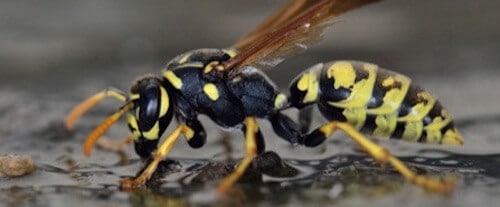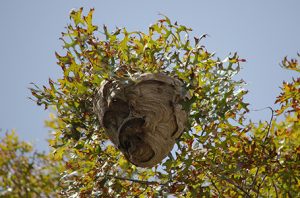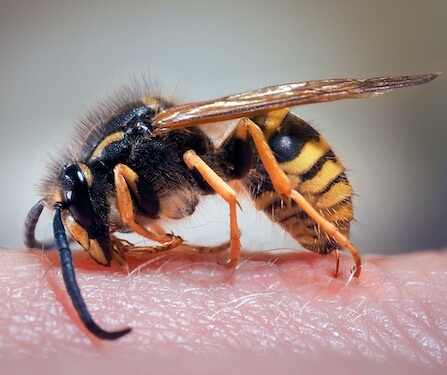Home » Exterminations » Insects » Wasps
Extermination of yellow wasp, hornets, black wasps, macon wasp, social wasp and gall wasp
Are you looking for a wasp exterminator on the South Shore of Montreal ? Nova Extermination’s specialized technicians will solve your wasp problem safely. If a wasp nest is found hanging on your house, or in a branch of one of your trees, our team is able to intervene quickly. Our experts then exterminate the wasps that are there. Want to know more? Find out how to remove a nest and exterminate wasps.
– There are over 30,000 identified species of wasps!
– There are wasp species for all colors! Indeed, there are red, green, blue, orange and of course yellow and black wasps!
Wasp exterminator: nest removal
Removing a wasp nest and relocating it to the forest turns out to be very risky and unsafe tasks. Wasps are more aggressive than bees. They attack intensely and sting anyone who threatens their nest. Depending on the location of the nest, it is sometimes possible to wrap the nest with a plastic bag and cut it from above to remove it. But the wasps must then be exterminated, even if they are useful insects for pollination.

It is best to act after sunset, to remove a nest. This is because the wasps are then at rest inside it. We don’t use flashlights to wake them up with light.
EXTERMINATION OF WASPS WITH A PESTICIDE
Spraying a pesticide is an effective way to deal with a wasp problem. Our experienced technicians know which methods to use for wasp pesticide extermination. To do so, our team wears appropriate protective clothing and uses safe equipment for working at height

Do not try to kill wasps on your own. Pest control products are not safe when misused. The product chosen must be approved by the government (with a specific registration number). It must therefore be approved by Health Canada in order to be used. Nova Extermination uses a government-recommended pesticide for wasp extermination.
Our trained and certified exterminators have many years of experience in wasp nest extermination on the South Shore. When we carry out the extermination of wasps by spraying pesticides, we take care that no pets (cats or dogs) are near our spraying site.
It can be very annoying to have a wasp nest inside or outside your home. It is important to understand their lifestyle and why they come to your home.
It is possible to take measures before the arrival of a colony, here is some additional information that will help you understand them better.

Wasps make their own nests from wood and saliva. Indeed, wasps chew the wood by mixing it with their saliva, which gives a cardboard effect once deposited on their nests.
Wasp nests start out very small and as time goes on, they get bigger. By the end of August, a nest can grow to a size of about 24 inches by 36 inches, and even larger if extermination is not done.
In case of a wasp sting, it is essential to remove the stinger as soon as possible. There are several techniques to relieve these stings. You can put a heat source to neutralize its venom, or cut an onion and let it rest on the wound. It is very important to disinfect it afterwards. If the condition does not improve, consult a poison control center immediately. Wasp stings are usually local and do not require intervention.
The lifespan of wasps is different for each, depending on the role they play in the colony.
The life span for the fertile wasp is one year, while sterile females will only be 12 to 22 days. For males, it is about 6 weeks. Male’s purpose is to reproduce wasps to increase the population of the nest, then die.
The queen has a life span of 1 year. Moreover, when winter arrives, she stays alive to start a new cycle the following spring. She makes her nest and deposits her first larvae. Then she dies, to make room for a new queen.
No!
Wasps are carnivorous! Although their stings are unpleasant and their presence is annoying, wasps have a very important role in the insect world. They fight against the proliferation of harmful insects that ravage crops and vegetation. Note that some male wasps can feed on the nectar of flowers and feed the larvae in this way too.
Some species of wasps sometimes lay their eggs directly into spiders or caterpillars. Once the eggs hatch, the larvae develop in the insect and feed on it.
There are many factors related to the location a queen will choose for her next colony. You can avoid having a nest in your home by understanding what wasps are looking for.
Water: Wasps, like all living things, need water! By leaving a pot of standing water in your yard, wasps will know that there is water available to them. They do not drink water from pools contaminated with chlorine.
Flowers: Although most wasps are not attracted to flower nectar as a meal, the males do use it to feed their larvae! Most wasps also like scented odors. This is why sometimes wasps will be attracted to hover around a person. If you have a lot of flowers in your home, wasps will be more tempted to move in.
Before winter, wasps look for a warm place to hibernate. If you have openings in your home such as soffits, windows or chimneys, they may find a way to build their next nest directly in your walls or ceiling.
Wasps are also looking for a place where they will be protected from the weather. It is important to close off all access to the interior of your home.
Call an exterminator to come and seal all entry points before a wasp nest forms in your ceiling!

Do not try to exterminate a nest of wasps yourself, they can be aggressive! Contact an exterminator at the first signs.

For wasps extermination on the south shore of montreal


Fill in this questionnaire for a free quote.
We guarantee to get back to you within 12h.

